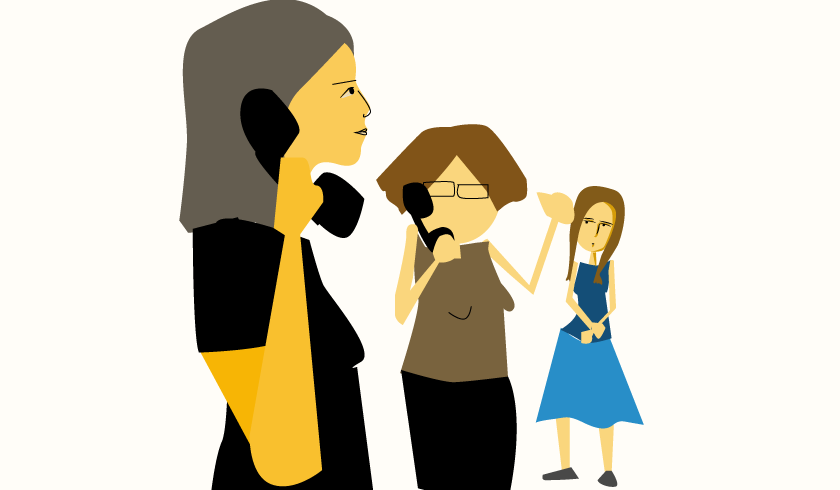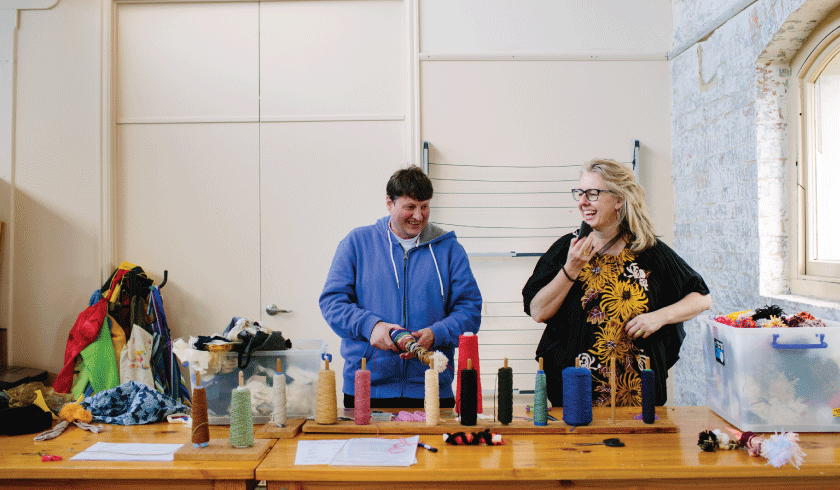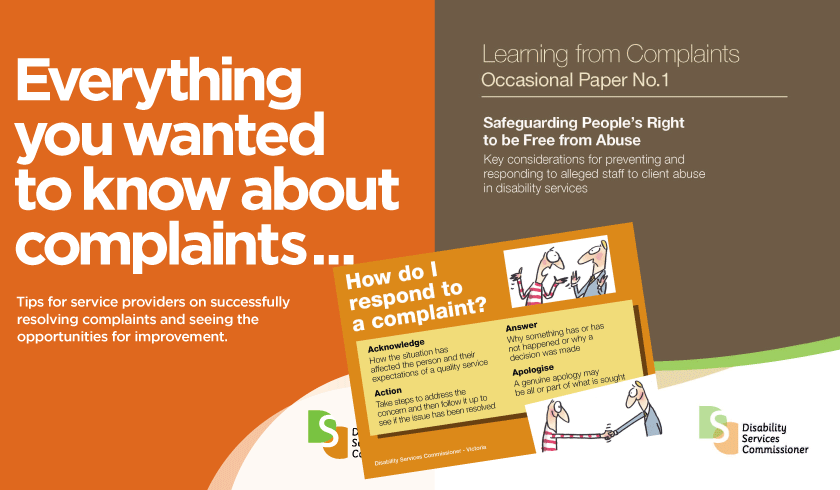An independent oversight body resolving complaints and promoting the right of people with a disability to be free from abuse.
Disability Services Commissioner (DSC) works with people with a disability to resolve complaints about disability service providers, and we work with disability service providers to improve outcomes for people with a disability.
What we can help with
DSC can help with complaints and enquiries about registered disability support services that are
-
- Funded or contracted by DFFH
- Funded by the Transport Accident Commission (TAC)
If you are a participant in the NDIS you can make a complaint by contacting the NDIS Commission via ndiscommission.gov.au or 1800 677 342.
If you are not sure whether we can assist you with your complaint, you can still contact us. If we can’t handle your complaint, we will help you find the most appropriate place to go.
Our service is independent, free, confidential and accessible.
Complaints Resolution
The Disability Services Commissioner can help with enquiries and complaints about disability services delivered by registered disability service providers under the Disability Act 2006 that are:
- Funded or contracted by the Department of Families, Fairness and Housing (DFFH)
- Funded by the Transport Accident Commission (TAC).
In addition, and in line with both the last and new Ministerial Referrals, we will continue to review incident reports and conduct investigations (including reviews of disability service provision to people who have died) for DFFH funded disability supports as well as complete any such reviews or investigations already underway.
Learn more about the complaints process, and assessments, conciliations and investigations.
Whether you are a person with a disability, a family member or friend of someone with a disability, a staff member, carer, or a member of the community – you have the right to contact DSC with a complaint or even just for advice and guidance.
If your complaint is out-of-scope as defined in the Disability Act 2006 (the Act), DSC can help you find the right place to go with your complaint. We have a ‘no wrong door’ approach and we’ll do our best to help you direct your complaint to the right place.
Back to top
Education and information
For people with a disability and their families, DSC has resources about how people can make a complaint about a service provider. These resources including brochures in multiple languages and formats.
For service providers, DSC has a number of resources about promoting a positive complaints culture and the importance of supporting clients to make a complaint, and the prevention of and responding to abuse. These resources including a Good Practice Guide and Complaints Guidelines.
Back to top
Community awareness
Sometimes people with disability and their networks might not know that we exist. They may not have visited our website, attended one of our education sessions, or their disability service provider may not have given them our information. That’s why we attend public forums, events, expos and any other event where we can tell people about what we do and how we can help.
Back to top
Oversight of critical incidents, deaths and matters of abuse and neglect
Via a Ministerial referral in accordance with section 16(c)and 128I(2) of the Act, DSC may inquire into and, at the Commissioner’s discretion, investigate any matter relating to the provision of services by disability service providers identified in the following:
- Incident reports received from the Department of Families, Fairness and Housing (DFFH), including all deaths (where the deceased was a person with a disability receiving services at the time of their death), and Category One or major impact incidents relating to assault, injury and poor quality of care.
- Deaths referred by the State Coroner where the deceased was a person with a disability receiving services at the time of the person’s death.
- Matters of abuse and neglect referred by the Community Visitors Board.
DSC has a protocol in place with DFFH, and a Memorandum of Understanding in place with the State Coroner, to facilitate these referrals. DSC also has a protocol with the Office of the Public Advocate to better facilitate referrals from the Community Visitors Board.
The purpose of these inquiries and investigations is to improve the services that are investigated, or to understand issues in the services being investigated in order to develop service improvements in response to those issues.
When conducting an investigation under this referral, DSC may provide a Notice to Take Action to a service provider to help improve services. If DSC is not satisfied with a provider’s response to a Notice to Take Action, they may conduct a follow-up investigation or name the provider in their annual report. Penalties also apply (find out more about penalties).
DSC has produced ‘Investigations: Guidance for Service Providers’, a booklet providing best-practice guidance to disability service providers undertaking internal investigations. Click here to access the booklet.
More information about the investigation of disability service provision to persons who were receiving these services at the time of their death is now available. Click here to access information sheets and FAQs.
Back to top
Commissioner-initiated investigations
DSC has the power to conduct ‘Commissioner initiated’ investigations into the provision of disability services where DSC identifies a persistent or recurring systemic issue about abuse or neglect in the provision of services, or, where DSC receives information that abuse or neglect may have occurred in the provision of a service to a person with a disability. These investigations will be only be undertaken if DSC considers that the investigation will assist in the improvement of services for people with a disability, and if DSC has the resources to conduct the investigation.
A service provider must ensure that DSC is provided with any assistance reasonably required to conduct the investigation. This may mean providing information and documents, giving staff time to attend interviews, or allowing DSC Authorised Officers to enter and inspect their service.
Following the conclusion of an investigation, DSC will provide written notice of the decision to any disability service involved in the investigation, and any people with disability who were the subject of the investigation. If the investigation has identified that issues of concern exist in the service or services, DSC has the power to issue a Notice to Take Action to disability service providers.
DSC will provide a report on a completed systemic initiated investigation to the Minister for Housing, Disability and Ageing, and the Secretary to the Department of Health and Human Services. This report may be made publicly available through tabling in the Victorian Parliament.
Download information sheet (PDF, 61KB).
See Frequently Asked Questions about investigations.
Back to top
Inspection powers
DSC Authorised Officers have the power to visit and inspect Victorian disability service providers at any location where they provide services (s. 132E, the Act). Download information sheet (PDF, 116KB).
DSC Authorised Officers have the power to:
- make enquiries and undertake investigations ;
- obtain access to relevant documents and things to examine, copy, and remove them;
- see and interview a person with disability, their relatives or support persons; and
- require the service provider and its employees and volunteers involved in providing services to answer questions.
A DSC Authorised Officer must first ask for consent if they want to enter the private bedroom of a person with disability, see their medical records, or interview them.
A DSC Authorised Officer will produce identification and let a service provider know the purpose of the visit when inspecting premises. A person who is providing services must ensure that a DSC Authorised Officer is provided with any assistance reasonably required in connection with the visit.
You can call our office on 1800 677 342 and speak to a member of the DSC Resolutions team to confirm the authority of the DSC Authorised Officer.
Back to top










